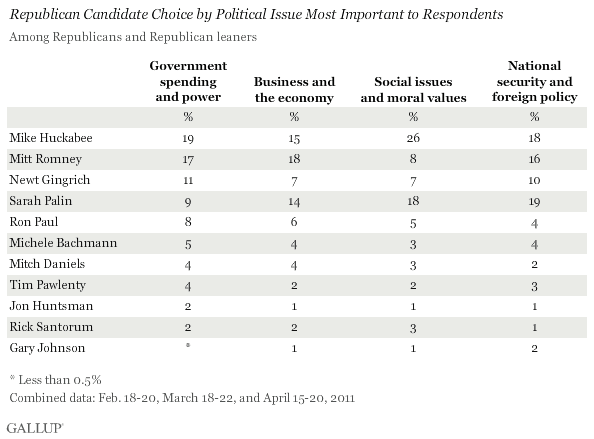PRINCETON, NJ -- Given a choice, 36% of Republicans say business and the economy are the most important political issues to them, up from 32% in March, and now on par with the percentage who say the same about government spending and power. Fewer Republicans choose either social issues and moral values or national security and foreign policy as their top political priorities.
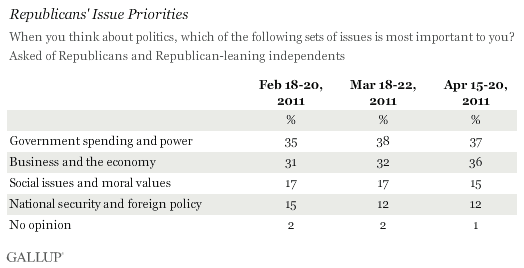
The latest results are based on interviewing conducted April 15-20, before the U.S. military actions in Pakistan that resulted in Osama bin Laden's death. Republicans in the April survey were least likely to choose national security and foreign policy as their top issue. This could change as a result of the recent events.
The increased importance Republicans place on business and the economy now as compared with the previous two months may reflect the continuing downturn in economic confidence since February.
Republicans Across Demographic Groups Agree on Top Priorities
Republicans in all major demographic and regional subgroups prioritize either government spending and power or business and the economy as their top political issues, based on an aggregated sample of more than 3,300 interviews with Republicans and Republican-leaning independents conducted in February, March, and April.
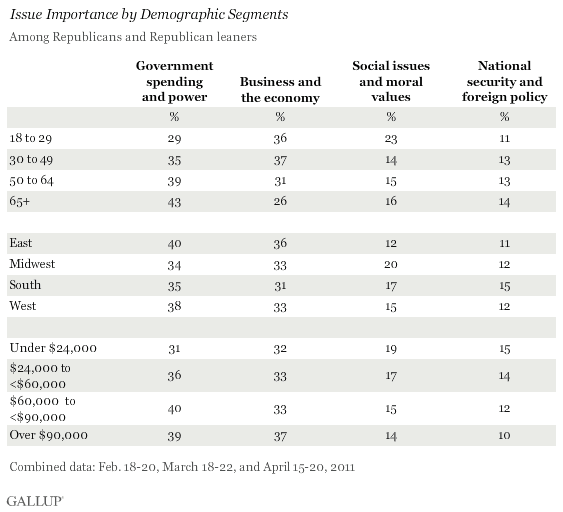
Younger Republicans, those aged 18 to 29, are more likely than their elders to choose social/moral issues as their top priority, and less likely to choose government spending and power. This is somewhat counterintuitive. Younger Americans in previous Gallup research have been the most likely to rate the current state of moral values as excellent or good, and most likely to say moral values are getting better rather than worse.
Moderate and Liberal Republicans Prioritize Business and the Economy
Generally, about two-thirds of Republicans and Republican-leaning independents are conservative, and one-third are liberal or moderate.
Forty-one percent of the moderate/liberal Republican group selects business/economy as its top issue priority, putting it in a clear No. 1 position -- well ahead of government spending and power. This group makes national security and foreign policy its third choice, with social issues coming in last.
Conservative Republicans, on the other hand, choose government spending and power as their top choice, followed by business and the economy and then social/moral issues. They are least likely to choose national security and foreign policy.
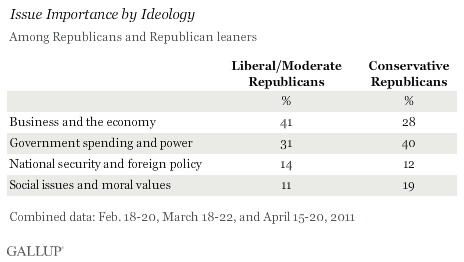
Social Issue Republicans Pick Huckabee; No Clear Winner in Other Issue Groups
Republicans' choice of issue priority is modestly predictive of their support for several potential candidates for the GOP nomination for president in 2012.
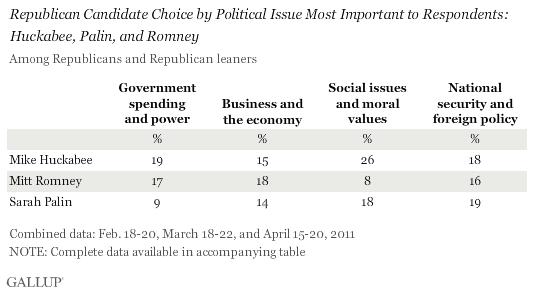
Former Arkansas Gov. Mike Huckabee has relative strength across all four issue groups. Huckabee, a former Baptist minister, does particularly well among those who prioritize social and moral issues -- 26% of whom say they would vote for him for president. He is, by a slight margin, also the top choice among those who say government spending/power is their top priority. Huckabee does less well among Republicans who care more about national security/foreign policy and especially business and the economy.
Like Huckabee, former Alaska Gov. Sarah Palin does relatively well among those who focus most on social/moral issues, with 18% of their vote. She and Huckabee are the only candidates who receive greater than 8% support from this group. Palin is the top choice by one percentage point among the small group of Republicans who prioritize national security and foreign policy issues. She is within a few points of the top candidate among those whose primary focus is business and the economy. Palin does less well on a relative basis among Republicans who focus most on government spending and power.
Former Massachusetts Gov. Mitt Romney is by a few points the top choice among those who prioritize business and the economy. He is also near the top among those who prioritize government spending and power, and among those who care the most about national security and foreign policy. Romney's relative weakness is among those who focus on social issues. He trails both Huckabee and Palin among this group.
Businessman and television personality Donald Trump was not included in Gallup's trial heat measures in February and March, and is therefore not part of these aggregate summary analyses. (The complete results for 2012 potential Republican candidates are found on page 2.)
Implications
Republicans clearly have two main political concerns that now provide the prism through which they view next year's presidential election -- government spending/power and the economy. They are significantly less likely to say either social issues or national security and foreign policy are their top concerns.
Republicans who prioritize business and the economy are more likely to be moderate or liberal in their ideology than the average Republican. They do not have a strongly differentiated choice for president, spreading their support among Romney, Huckabee, and Palin, in that order.
Those who prioritize government spending and power are more likely than average to be conservative, and split their early support between Huckabee and Romney. Palin does much less well among this group, barely edging out Texas Congressman Ron Paul by one point.
More than a fourth of Republicans whose top priority is social/moral issues choose Huckabee for their party's presidential nomination, the highest proportion of support for a candidate among any of the four issue groups. Social issue Republicans also like Palin, while giving only single-digit support to any other candidate.
The small group of Republicans whose priority focus is on national security and foreign policy split their support among Palin, Huckabee, and Romney.
Survey Methods
Results are based on telephone interviews conducted as part of Gallup Daily tracking April 15-20, March 18-22, and Feb. 18-20, 2011, with a random sample of at least 1,000 Republicans and Republican-leaning independents, aged 18 and older, living in all 50 U.S. states and the District of Columbia, at each of these time periods.
For results based on each month's sample of Republicans, one can say with 95% confidence that the maximum margin of sampling error is ±4 percentage points.
For results based on the total aggregate sample of 3,304 Republicans, one can say with 95% confidence that the maximum margin of sampling error is ±2 percentage points.
Interviews are conducted with respondents on landline telephones and cellular phones, with interviews conducted in Spanish for respondents who are primarily Spanish-speaking. Each sample includes a minimum quota of 400 cell phone respondents and 600 landline respondents per 1,000 national adults, with additional minimum quotas among landline respondents for gender within region. Landline telephone numbers are chosen at random among listed telephone numbers. Cell phone numbers are selected using random-digit-dial methods. Landline respondents are chosen at random within each household on the basis of which member had the most recent birthday.
Samples are weighted by gender, age, race, Hispanic ethnicity, education, region, adults in the household, and phone status (cell phone only/landline only/both, cell phone mostly, and having an unlisted landline number). Demographic weighting targets are based on the March 2010 Current Population Survey figures for the aged 18 and older non-institutionalized population living in U.S. telephone households. All reported margins of sampling error include the computed design effects for weighting and sample design.
In addition to sampling error, question wording and practical difficulties in conducting surveys can introduce error or bias into the findings of public opinion polls.
For more details on Gallup's polling methodology, visit www.gallup.com.
